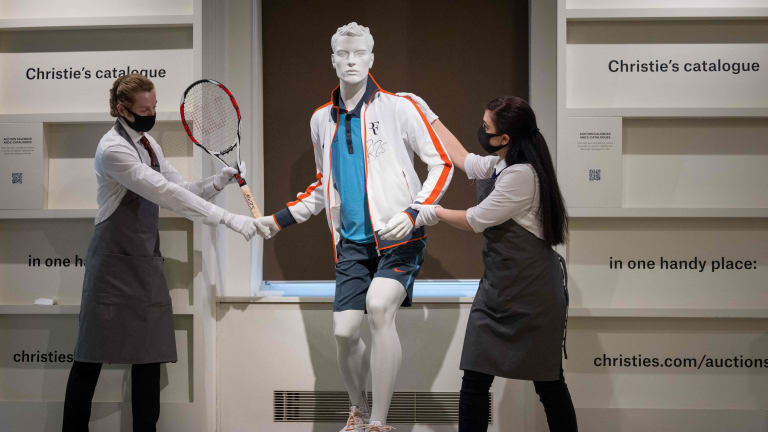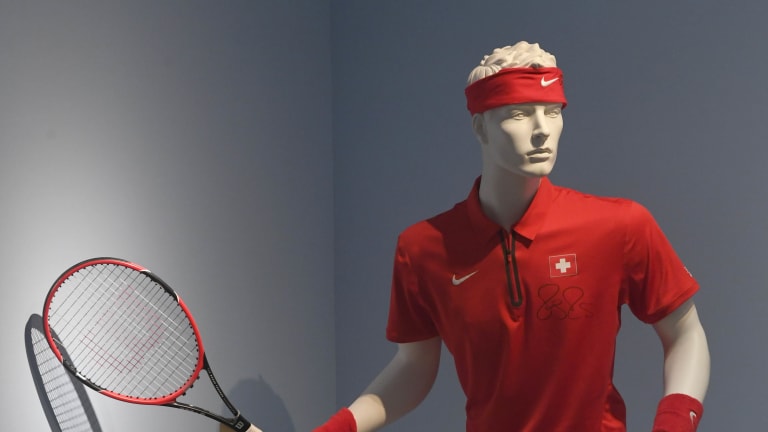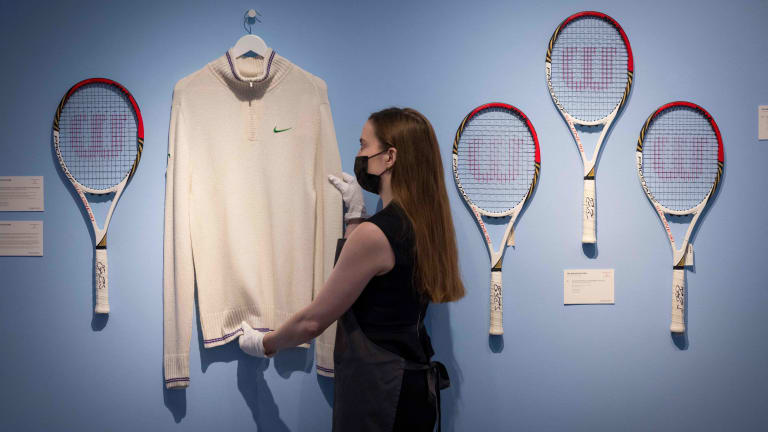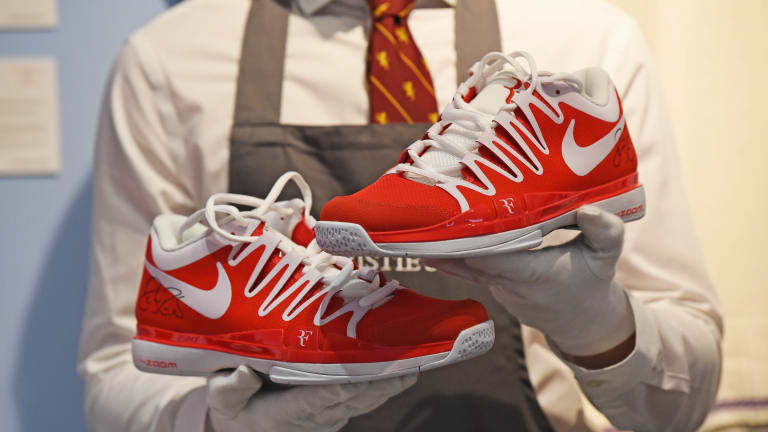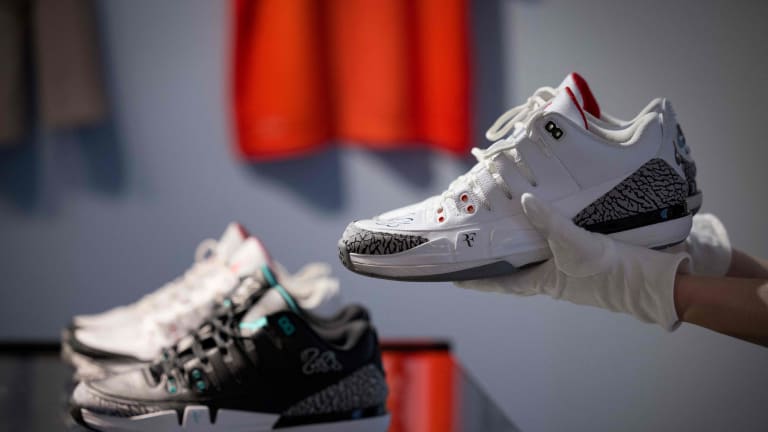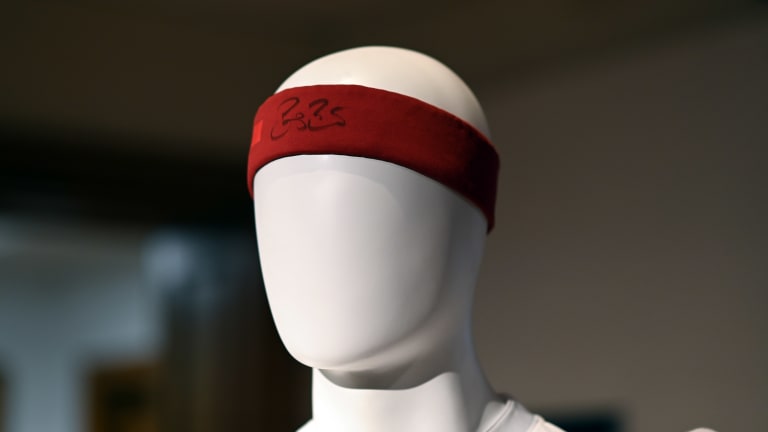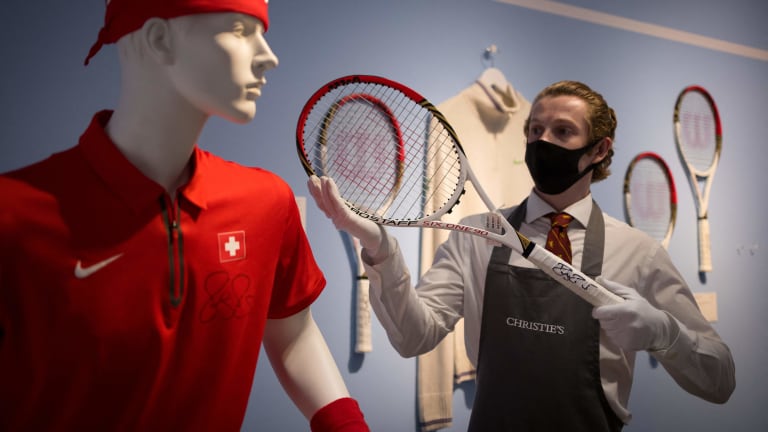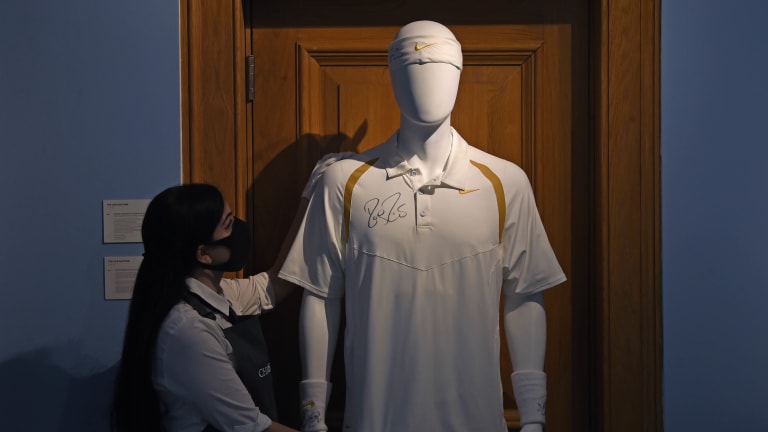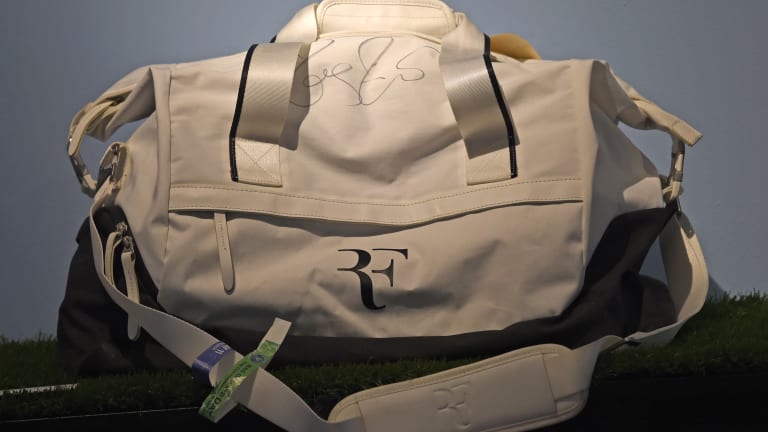Is the end near for Roger Federer?
By Peter Bodo Jun 22, 2021Wimbledon to replace line judges with electronic line calling from 2025
By TENNIS.com Oct 09, 2024The amazing journey of Henry Patten from IBM data logger to Wimbledon doubles champion
By TENNIS.com Jul 16, 2024Hsieh Su-Wei, Jan Zielinski win mixed doubles title at Wimbledon
By Associated Press Jul 15, 2024Why Wimbledon Endures
By Peter Bodo Jul 15, 2024Novak Djokovic seeks 2024 answers for Alcaraz and Sinner after great effort: 4 ATP Wimbledon takeaways
By Joel Drucker Jul 14, 2024Carlos Alcaraz is a champion establishing how high he will climb with latest Wimbledon title
By Steve Tignor Jul 14, 2024Nicolai Budkov Kjaer makes history in winning junior boys' Wimbledon title; Renata Jamrichova wins girls' title
By Associated Press Jul 14, 2024Carlos Alcaraz beats Novak Djokovic again in Wimbledon final for fourth Grand Slam title
By TENNIS.com Jul 14, 2024For Jasmine Paolini, Barbora Krejcikova was one forehand and one serve too good in the Wimbledon final
By Steve Tignor Jul 13, 2024Is the end near for Roger Federer?
Might the 39-year-old be closer to saying “thanks for the memories” than he’s been letting on, or we’ve assumed—and if so, how will he take his leave?
Published Jun 22, 2021
Advertising
WATCH: Roger Federer's revealing press conference after a second-round loss in Halle.
Roger Federer, who habitually gets his post-match obligations out of the way swiftly, was uncharacteristically late meeting with reporters in Halle last week following his second-round, three-set loss to Felix Auger-Aliassime.
Federer explained that he took his time because he wanted to “truly understand” why he slipped into a funk and allowed his young rival to win the 6-2 third set going away. It was something he talked through with his coach, Ivan Ljubicic. He was in a pensive mood and seemed slightly bewildered as he described the conversation.
“We decided to figure it out,” he said. “Straightaway, head up, look forward, don’t take any silly decisions right now and just take it on to the next goal, which clearly is Wimbledon.”
It was that fleeting reference to “silly decisions” that struck an ominous note and, along with his performance and other comments, added to the rash of speculation about what the future holds for the struggling Swiss star. Is he closer to saying “thanks for the memories” than he’s been letting on, or we’ve assumed—and if so, how will he take his leave?
Those are compelling questions due to Federer’s status as a global face of the game. For his status ensures that he can’t just go on, quietly drifting into the arms of the retirement forced upon most pros, even highly ranked ones, by age and the erosion of skills.
Countless fans expect and hope that Federer will “go out on top,” preferably at the tournament that most closely aligns with his own reverence for tennis, Wimbledon. The tournament became his lodestar during his long, recent absence. It’s the venue where he wants to make a statement, but we don’t know if it will be his closing statement.
“I would love to see him go out winning Wimbledon,” the iconic Chris Evert told me, “But if he reached the quarters or semis and stopped, to me he would still be going out on top.”
Advertising
I don’t think he should compete if he’s significantly below ‘Roger Federer level,’ and I thought the final two sets [in Halle] were significantly below that level. Pam Shriver
The idea of “going out on top” has always held sway in the popular imagination. It’s a clinical, emphatic way to reaffirm an athlete’s majesty at the very moment it is being extinguished. But the goal is as unattainable as it is alluring. Pete Sampras is the only tennis player who pulled it off, although he did not officially retire for another year after his last match. Sampras’ career-defining win at the 2002 US Open is tennis’ ultimate mic-drop moment.
Evert quit the tour at 34, with the sound of rising stars Monica Seles and Steffi Graf’s footsteps admittedly growing louder behind her. She announced in January 1989 that the season would be her “farewell” tour, and ended her career still ranked No. 4, after she lost in the quarterfinals at the US Open.
“I was in the top three for 18 years of my pro career,” the 18-time Grand Slam singles champion said. “But after 1986, I just felt that I wasn’t in the race for majors anymore. And my whole career I was in that race. So it wasn’t a struggle to quit.”
It’s hard to tell if Federer is still in that thrilling race; he simply hasn’t played enough since knee surgery interrupted his flow following the 2020 Australian Open (where he reached the semifinals). Federer is thoughtful, reasonable and honest, but he also plays his cards very close to his vest. The precise condition of Federer’s surgically repaired right knee is known only to him and his team, but his withdrawal from the French Open before his fourth-round match was portentous.
The most optimistic interpretation of the decision that it was part of his master plan for peaking during the grass season at Wimbledon. Then came the failure in Halle.
“I’m uneasy about him for the first time,” Hall of Famer and Tennis Channel analyst Pam Shriver told me. “I don’t think he should compete if he’s significantly below ‘Roger Federer level,’ and I thought the final two sets [in Halle] were significantly below that level.”
Advertising
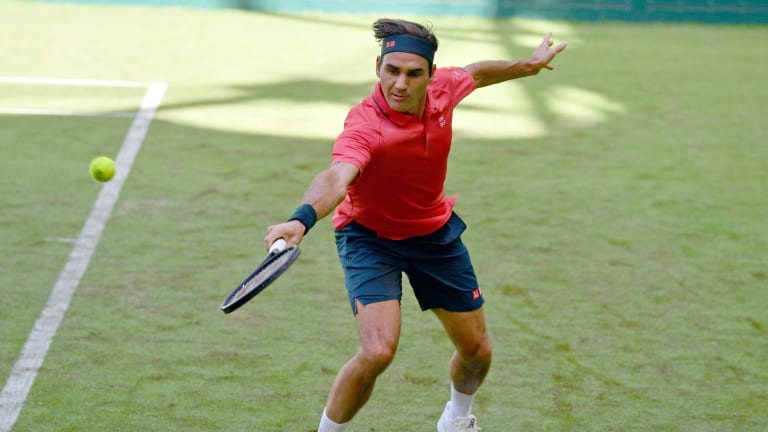
“With the uncertainty of his physical condition, it’s going to be very tough for Roger,” says Patrick McEnroe about Federer's grass-court prospects. (Getty Images)
© Getty Images
The loss to Auger-Aliassime was puzzling mainly for Federer’s attitude and body language. Referring to his surgery and rehab, Federer said, “Things don’t come simple, and they don’t come easy, and you second guess yourself rather quickly, unfortunately. That sometimes is the biggest worry.”
Federer added that he enjoyed his hiatus and even his rehab work, but admitted, “Once on court you want it so bad like you used to, but then you get on the court and you’re disappointed with the performance, or shots, or a feeling you have, or a negativity that creeps in and you think that's too bad, why is this happening?”
Those things are most likely happening for three reasons: age and an attendant decline in enthusiasm; a lack of match play; and the sense of vulnerability that often follows surgery. Two of those impediments are surmountable, but overcoming them requires something that Federer doesn’t have a lot of: time.
“I don’t know how much he (Federer) has in the tank, mentally,” Evert said. “I know his body cannot play a full year. He loves the game, though. He hung in, trained hard, went through two surgeries over a year just to keep playing and to try to do well at Wimbledon. I just wish he had more matches going in. He needs more matches.”
The problem for Federer is that he has rationed those important tuning matches, or failed to win them in order to earn more. The state of his knee is a mystery, but the limitations associated with the injury are obvious. Federer may be at his best on cushioned, forgiving grass courts but, in Shriver’s view, “When you have knee issues, a slippery surface like grass can also create anxiety.”
Shriver added that the French Open exposed once again the toll taken by best-of-five set tennis, and she believes that Federer was wary of finding himself in one or more of those knock-down, drag-out epic. But all the majors play best-of-five.
“Physically, grass is not as taxing. You can get through a couple of matches pretty easily if you’re one of the few guys who is really good on grass,” ESPN analyst Patrick McEnroe said in a recent interview.
But, he added, the level of the younger players has increased during the year-plus that Federer was away.
“Combined with the uncertainty of his physical condition, it’s going to be very tough for Roger.”
Advertising
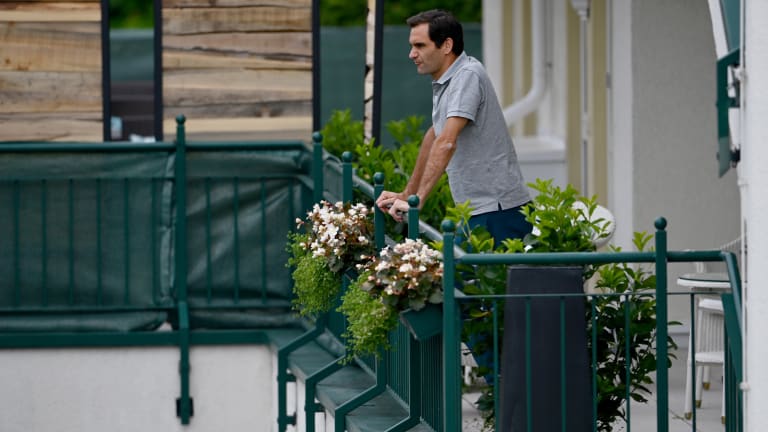
Federer, seen here watching a match at the Noventi Open in Halle, is thoughtful, reasonable and honest, but he also plays his cards very close to his vest. (Getty Images)
© Getty Images
Federer has not looked beyond Wimbledon, at least not publicly. That landscape now appears bleak. Before the twin challenges of surgery and the pandemic interrupted Federer’s career, he often cited the upcoming Tokyo Olympics as both a goal and a potential career crossroads (the Games begin on July 23). Due to the ongoing struggle with Covid-19 in Japan, Federer isn’t even sure he will go to Tokyo.
Whether or not Federer targets the US Open will probably be determined at Wimbledon. But few observers are sanguine about his prospects during the North American hard-court summer. They remember how Federer struggled during the heat wave at the 2018 US Open, losing in the fourth round to journeyman John Millman. Lack of seasoning and durability may be an even larger issue in New York than it is for Wimbledon.
“Look what happened at the French Open, on softer clay,” Shriver said. “Will Roger’s knees be that much better and ready for best-of-five set hard-court matches just two months later?”
Such questions make it easy to envision Wimbledon as a fitting last stand for the man who has hoisted the winner’s trophy at the All England Club a record eight times, his most at any Grand Slam venue (Federer has 20 major singles titles). The man’s own efforts in recent months to position Wimbledon as a pivot point also fuels the narrative that however Federer fares at Wimbledon, it may be the last stop on his tennis journey.
But the US Open is the most common venue for retirements, if only because it’s the final Grand Slam event of the year. Andre Agassi and Andy Roddick are among the many elite players who retired after losing matches at the US Open. Agassi’s decision was planned for months; Roddick announced mid-tournament in 2012, on the day of his 30th birthday, that he was closing up shop after the tournament. (He lost to Juan Martin del Potro in the fourth round).
The “farewell” year is the most common way blue-chip players choose to go out. The idea is to generate public interest, higher profit, and inspiration. It’s a way for players accustomed to the limelight to bask in it once again, and to stop and smell the roses along the way.
The players who took that path include Evert, Stefan Edberg, Martina Navratilova and Gustavo Kuerten, among others. Federer and his former coach Edberg have already discussed that option, with Edberg—surprisingly—counseling against a farewell tour. The Swedish star felt that his farewell year of 1996 was a somewhat unsatisfying experience.
“We actually talked a little bit about it, and I would not recommend it to anybody, actually,” Edberg told The Tennis Podcast in November. “It puts too much pressure on yourself, and there will be too many things going on in your mind. If you're going to announce it, I would do it just before my last tournament…or have it in my mind but not for anybody else to know.”
Advertising
Federer is not just some garden-variety Grand Slam champion. He’s been the gold standard of his breed for a long time, and his enduring passion for the game in every aspect suggests that we are using the wrong word in “retire.” Rest assured, Federer is not about to beat feet to the Alps to spend the rest of his life milking cows. He’s likely to remain a force and presence in the sport.
The creator of the Laver Cup, Federer could link his retirement from competitive tennis to that exhibition event, its latest edition taking place in Boston in September. He will almost surely continue as a player-coach, perhaps for many years.
Shriver suspects that Federer’s team is working on some kind of farewell tour or event. Evert concurred, saying, “I would bet he has a farewell exo tour. He’s so popular. In many countries, he’s still a god.”
The elite players all seem to agree on one thing. When and how to retire is a deeply personal decision. As Agassi put it in a text message about Federer’s retirement from the competitive game, “I would like to see him go out the way he wants to go out.”
